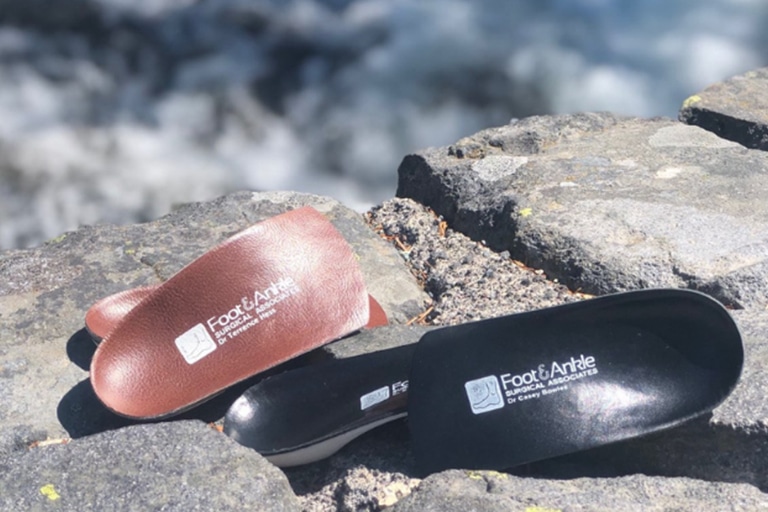
prescription medical devices that you wear inside your shoes to correct biomechanical foot problems.
Custom orthotics

Orthotics are custom-made shoe inserts that correct an abnormal or irregular walking pattern. Sometimes called arch supports, orthotics allow people to stand, walk and run more efficiently and comfortably. While over-the-counter orthotics are available and may help people with mild symptoms, they are made for an average foot. They normally cannot correct the wide range of symptoms that prescription orthotics can since they are not custom-made to fit an individual’s unique foot structure. Think prescription eyeglasses versus generic readers.
Orthotics come in several shapes, sizes and materials. They fall into the following three main categories:
- Those designed to change foot function
- Those that are primarily protective
- Generic over-the-counter varieties
How Do Orthotics Work?
Orthotics provide shock absorption to help give your foot and lower leg some cushion as they hit the ground, which is especially important if you have a foot condition or are recovering from surgery. Without orthotics, the affected foot takes on the full weight of each step. Orthotics alter and distribute the pressure from the ground to your foot as you step, which reduces foot injury from repetitive and excessive stresses.
Anyone can benefit from custom orthotics to prevent injury or help a sensitivity before it becomes problematic. However, patients who have recently undergone knee, hip or lower back surgery or have struggled with flat feet or high arches can especially benefit from custom orthotics.
Types of Orthotics
The type of orthotic you need is often based on your condition. Foot & Ankle Surgical Associates can help craft both functional and accommodative orthotics for an ideal fit.
Functional
Functional orthotic devices are designed to control function and are used primarily for walking or dress shoes. They are often composed of a firm material, such as plastic or carbon fiber. Functional orthotics are made from a mold after a podiatrist takes a plaster cast of the foot in its neutral and optimal position. Functional orthotics control the motion of the foot and ankle joints that are responsible for optimal ambulation, improving normalcy. Contact us to learn how they can help eliminate strains, aches, and pains in the legs, thighs, and lower back.
Accommodative
Accommodative orthotics are generally used to absorb shock, increase balance and take pressure off uncomfortable spots or ulcerations. They are usually effective for diabetic, arthritic and deformed feet. Accommodative orthotics are typically made up of soft, cushioned materials so that they can be worn against the sole of the foot. Like functional orthotics, accommodative orthotics are also made from a mold after a podiatrist takes a plaster cast of the foot in its neutral and optimal position.
Benefits of Custom Orthotics
Every foot is different, which is why orthotics cannot be one-size-fits-all. At Foot & Ankle Surgical Associates, we strive to create quality orthotics that:
- Saves you long-term costs: While average orthotics are less expensive initially, they may only worsen your condition. Instead, custom orthotics work as a proactive way to reduce long-term injuries and their treatment costs.
- Corrects foot abnormalities: By fitting perfectly with the contour of your feet, orthotics can address foot complications at their root and work to correct them as you walk with proper support, providing pain relief.
- Improves overall posture: Proper foot support can help your whole body move ergonomically, even reducing neck and back pain.
- Makes movement comfortable: With custom orthotics, you can move comfortably again and return to your favorite sports and activities.
Your Doctor for Shoe Orthotics in Southwest Washington State
The team at Foot & Ankle Surgical Associates is ready to help you get fitted for your custom orthotics. The process is simple — all you have to do is contact us online or call us at 360-754-3338 to set up an appointment. When you come in, we will measure your foot and use a mold to ensure the perfect fit. We will contact you when your professional custom orthotics are ready for pickup.
Foot & Ankle Surgical Associates has locations throughout southwest Washington. We are proud to be your doctor for shoe orthotics in Centralia, Lacey, Olympia, Tacoma and Tumwater, Washington.
Podiatry services
How can we help you?

An affiliate of FASA Family Wellness PLLC

An affiliate of FASA Family Wellness PLLC




